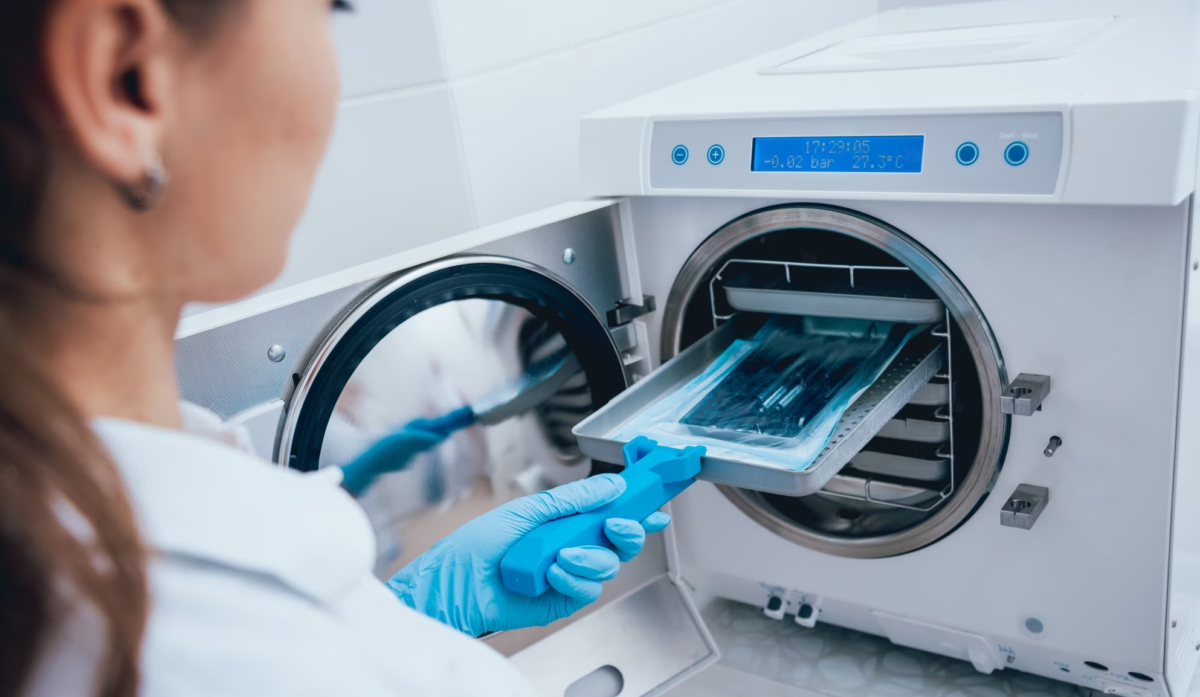
Precision, safety, cleanliness, and patient well-being form the crux of dentistry. Upholding impeccable cleanliness and sterilization practices is an absolute must. Dental procedures involve intimate contact with patients’ oral cavities, raising the stakes for infection control to unprecedented heights. Fret not! Dental autoclaves are the unsung heroes of the sterilization process. These sophisticated sterilization devices are designed to effectively kill microorganisms, ensuring safety for both the patient and the dentist. Let us explore the role of dental autoclaves in maintaining a sterile environment and safeguarding your health at each dental visit.
The Functions of a Dental Autoclave
Dental autoclaves are built to eradicate detrimental microorganisms such as bacteria, viruses, fungi, and spores from. Employing a blend of heat, steam, and pressure, these autoclaves can attain and uphold temperatures ranging from 121 to 134 degrees Celsius (250 to 273 degrees Fahrenheit). Through this intense heat, the cellular composition of pathogens is dismantled, rendering them inert and impeding their transmission.
In dentistry, an extensive array of instruments interact with the patients’ oral cavities, encompassing dental drills, forceps, scalpels, and mirrors, among others.
After each use, these tools necessitate meticulous sterilization to eradicate any possibility of cross-contamination between patients. Autoclaves serve as a dependable and efficient solution for sterilizing these instruments. By subjecting them to the sterilization process, dental autoclaves guarantee the safety of reusable instruments, thereby safeguarding patients from potential infections.
Dental healthcare professionals are obligated to observe rigorous regulatory protocols to ensure infection control and safeguard patient well-being. Many countries follow guidelines established by esteemed organizations like the Centers for Disease Control and Prevention (CDC) and the World Health Organization (WHO). Integral to meeting these stringent standards are dental autoclaves. Utilizing autoclaves for instrument sterilization allows dental practices to showcase their dedication to upholding a hygienic and secure environment, thereby fulfilling or surpassing the mandates laid out by regulatory authorities.
In the realm of dentistry, patients exhibit a wide range of characteristics, including age, health conditions, and immune system resilience. Among them, certain individuals, like children, elderly patients, and those with compromised immune systems, are especially prone to infections.
The implementation of dental autoclaves proves vital in safeguarding the health of these vulnerable patients. By guaranteeing the sterility of all instruments employed during their treatments, autoclaves effectively eradicate the risk of infection transmission. Consequently, they play a crucial role in enhancing patient outcomes and reducing the likelihood of complications.
The rise of antibiotic-resistant bacteria has become a global concern. Overuse and misuse of antibiotics have contributed to the development of these resistant strains. By employing dental autoclaves, dental practices can help prevent the spread of infections, reducing the need for antibiotics in the first place. This proactive approach contributes to the fight against antibiotic resistance and supports the responsible use of antimicrobial agents.
Dentists often use sharp invasive instruments that come in contact with blood. Autoclaves play a pivotal role in thoroughly sterilizing these instruments, thereby eradicating the potential transmission of bloodborne pathogens like hepatitis B and C, as well as human immunodeficiency virus (HIV). This becomes indispensable in safeguarding the well-being of both patients and dental healthcare providers against these potentially life-threatening infections.
By incorporating dental autoclaves as a standard part of infection control protocols, dental practices instill confidence in their patients. Patients can trust that the dental office takes their safety seriously and follows rigorous sterilization procedures. This reassurance contributes to patient satisfaction and builds a positive reputation for the dental practice.
Dental instruments are often expensive and delicate. Autoclaving ensures that these instruments are properly maintained and sterilized, extending their lifespan. Regular autoclaving prevents corrosion and degradation caused by the buildup of biological materials, helping to protect the investment made in high-quality dental instruments.
Dental autoclaves facilitate a streamlined workflow in dental practices by offering rapid and efficient sterilization capabilities. This ensures that instruments are promptly available for use during procedures, leading to improved efficiency, reduced waiting times, and enhanced overall patient management.
Using a dental autoclave regularly is an ecologically responsible approach to instrument sterilization. In contrast to chemical disinfection, autoclaves predominantly employ heat and steam, thereby minimizing the necessity for hazardous substances and lessening the practice’s environmental impact. By opting for autoclaves, dental practitioners actively partake in fostering sustainable practices within the healthcare domain.
In summary, dental autoclaves play a pivotal role in preventing the transmission of infections, safeguarding both patients and dental healthcare professionals, and maintaining regulatory guidelines. Moreover, they foster patient trust, prolong the durability of instruments, streamline workflow, and contribute to environmental sustainability. Dental offices that prioritize the use of autoclaves exhibit their dedication to upholding a secure, sterilized, and conscientious approach to oral healthcare.